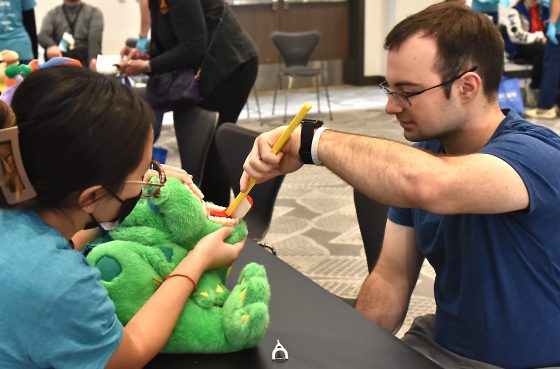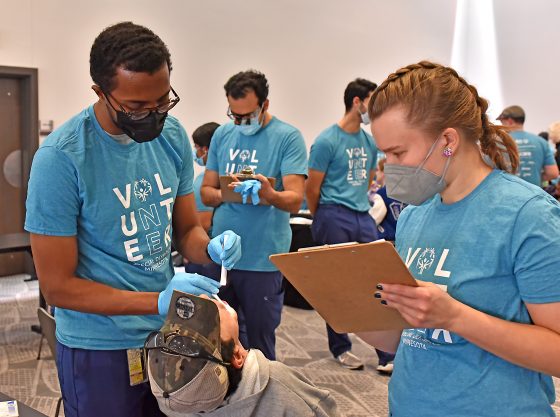Friday, April 7, 2023 is World Health Day! An important part of the Special Olympics mission is to make healthcare more accessible and inclusive for all. In Minnesota, we are committed to improving the health of individuals with intellectual disabilities by promoting fitness and providing free health screenings all year long.
Here are five ways Special Olympics is making our state—and the world—a healthier, more inclusive place:
1. Providing free health screenings for people with intellectual disabilities.

Special Olympics Minnesota athlete completing Special Smiles dentistry screening
Despite severe need and higher health risks, people with intellectual disabilities are often denied health services and die on average 16 years sooner than the general population. This is unacceptable.
To combat these health disparities and keep athletes performing at their best, Special Olympics Minnesota offers free health screenings and education in eight disciplines: podiatry, physical therapy, nutrition, audiology, physical exams, vision, dentistry and mental health.
2. Lobbying on Capitol Hill for critical funding to support inclusive healthcare.
Every year, Special Olympics Minnesota athlete leaders travel to Washington, D.C., to meet with members of Congress for Capitol Hill Day, inviting elected officials to partner with them in support of inclusive health initiatives for people with intellectual disabilities.
Athletes educate lawmakers and their staff about the stigma faced by people with disabilities and how Special Olympics health programs reduce discrimination and create equal opportunity. Our athletes play a huge role in spreading the mission of inclusive health and securing critical funding to support our health programs!
3. Providing sports and fitness opportunities for all.
Physical activity is an important aspect of overall health. Sports are an incredible way to stay in shape while having fun, and they will always be at the core of Special Olympics Minnesota’s mission.
Through Unified sports, people with and without intellectual disabilities have the opportunity to play on the same team, getting regular exercise while fostering inclusion in their communities.

Healthy Athletes volunteers performing health screening at the 2022 Inclusive Community Health Fair
4. Training health professionals on how to work with people with intellectual disabilities.
Over 80% of healthcare providers are not professionally trained to treat people with intellectual disabilities. Special Olympics is aiming to reverse this statistic by educating and empowering health professionals through Healthy Athletes volunteer opportunities and clinical director trainings.
Ensuring that the health workforce is adequately trained and equipped to care for patients with intellectual disabilities is essential in making the world more inclusive for all.
5. Creating meaningful opportunities to socialize and meet new people.
While sports will always stay at the core of our mission, Special Olympics continues to evolve, creating more opportunities for recreational activities and social inclusion in every aspect of life. Studies show that young adults with intellectual disabilities who participate in Special Olympics are half as likely to be diagnosed with depression as those who do not participate.

